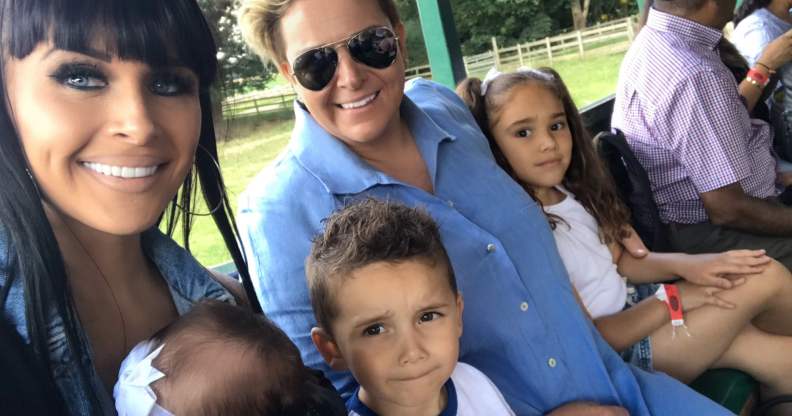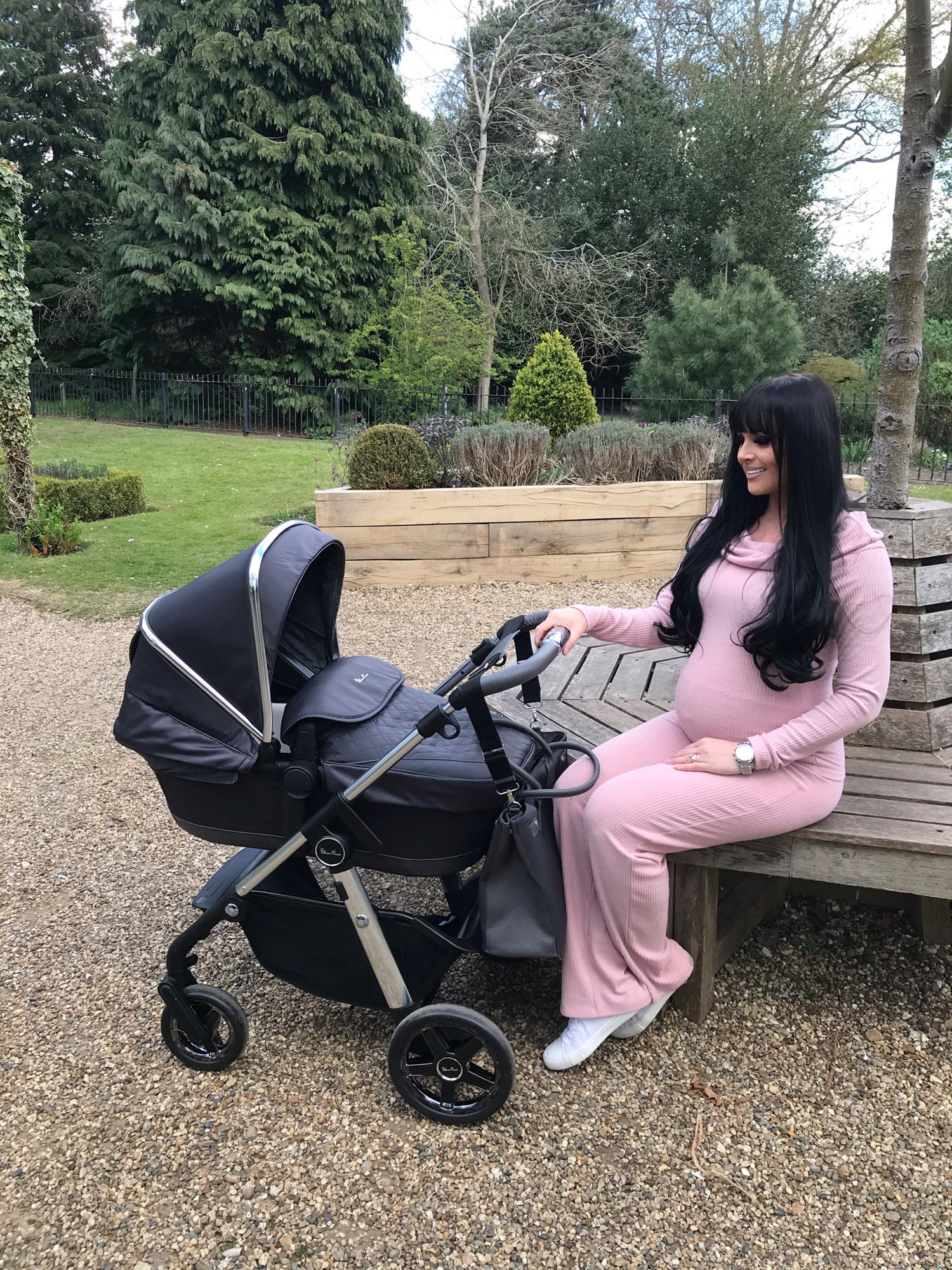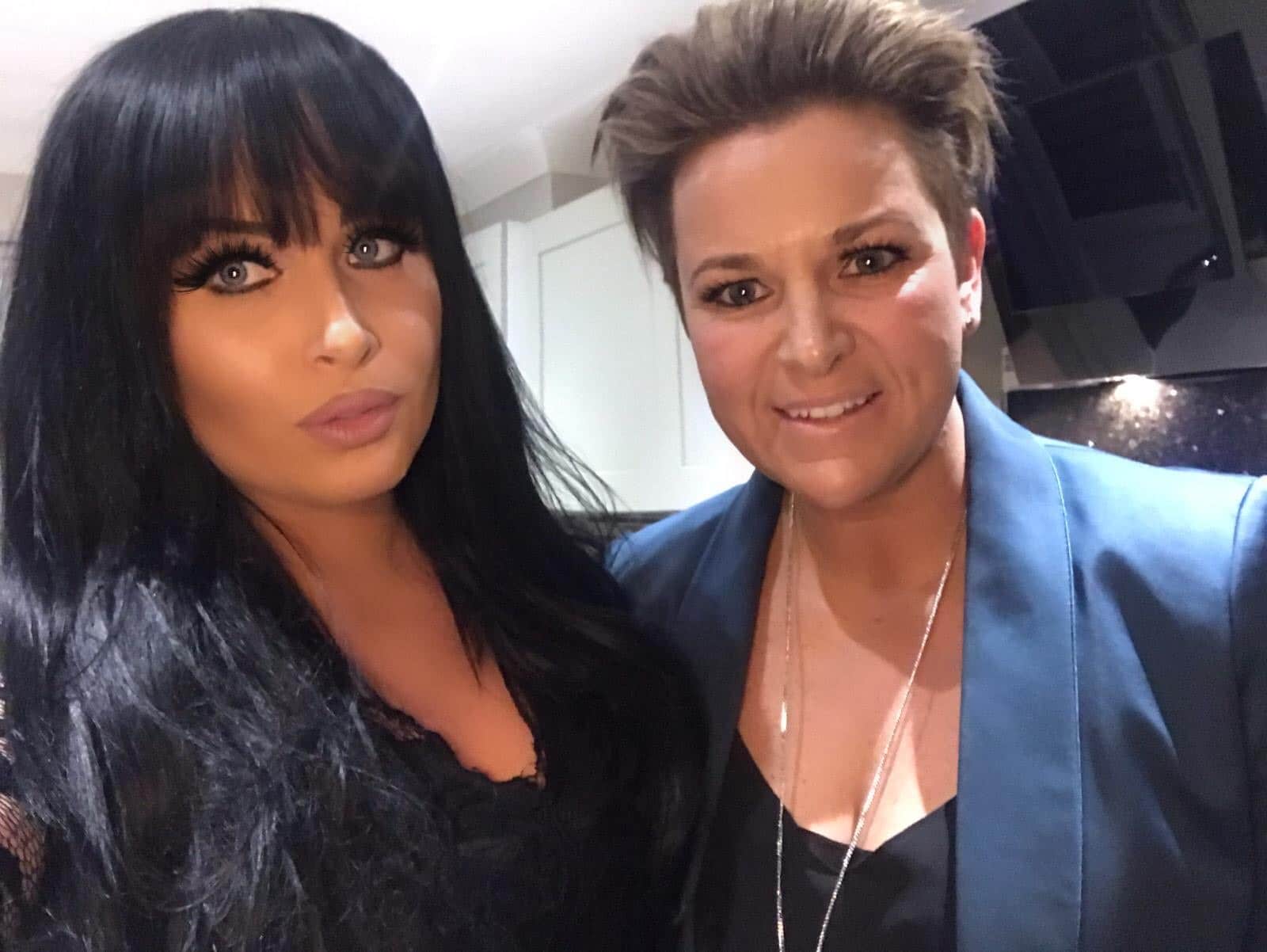Devoted mums forced to overcome towering barriers to have family they dreamed of: ‘We need better’

Laura-Rose Thorogood (L) and her wife Stacey with their three children. (Provided)
To mark Fertility Week 2021, we speak to Laura-Rose Thorogood, a mum of three and advocate for LGBT+ parenting rights, about the barriers that queer people continue to face.
Laura-Rose Thorogood always knew she wanted to be a mum – so it was devastating when she realised just how expensive it would be to start a family as a queer woman.
Many people see LGBT+ rights as something that has been won – but the reality is very different for those who crave the opportunity to raise their own children. In fact, access to fertility treatment for queer people remains unequal across the UK.
According to the British Pregnancy Advisory Service (BPAS), fertility services are commissioned at a national level in Scotland, Wales and Northern Ireland, meaning people all across those regions have the same rights and access when trying to start a family.
In England, prospective parents must be able to show that they have tried to have a baby through other means before they can access NHS-funded IVF. For mixed gender couples, this is relatively straightforward: they must be able to show that they have been unsuccessfully trying to have a baby through sex for two years. Same-sex couples, however, must undergo several unsuccessful rounds of private IVF before they can be considered for NHS treatment.
To make matters even more complicated, this requirement varies depending on where you live – meaning queer people are stuck in a “postcode lottery” system.
This was the complicated system that Laura-Rose and her wife Stacey walked into. They were able to afford private care – but the cost was high. They now have three children, and they’ve paid in excess of £40,000 for the privilege.
Laura-Rose is well aware just how lucky they are that they have had the opportunity to become parents in a country that still fails to adequately support LGBT+ parents. Speaking to PinkNews to mark Fertility Week, Laura-Rose explained that she became a mum because she had a deep, yearning need to start a family.
Laura-Rose Thorogood and her wife faced high costs and discriminatory comments on their parenting journey
Both Laura-Rose and Stacey are from large families and both felt strongly that children needed to be a part of their future.
“We knew we wanted quite a few, but we knew it would be quite expensive,” Laura-Rose says. “We know we’re quite fortunate to have that opportunity because there’s so many people that we support across the LGBT Mummies Tribe, our organisation, that will just never have that opportunity, or they really struggle to get pregnant, or they just can’t afford it.
“We always say as an organisation, it’s every human’s right to have a child by their first chosen route if it’s possible. We’re really lucky that we got that opportunity so we could have our children. For us, they are everything. They’re the centre of everything we do.”
Since starting her family, Laura-Rose has worked tirelessly to make things better for other LGBT+ people who want to have children. She has met with the government equalities office and has had conversations with the NHS’ LGBT+ healthcare team. She says that the current system, under which queer people must pay privately for IVF before accessing it on the NHS, is “wholly discriminatory”.
“Either you have free access for everyone, or you don’t give it to anyone, or you means test it,” Laura-Rose says. “So yes, it’s quite unfortunate that we had to pay for it, and we were really lucky that we could afford it, but that’s why I think it should be means tested. If you can’t give it to everyone, give it to heterosexuals and LGBT+ people that come from social deprivation or low income who can’t afford private treatment. Because then at least the people that really can’t ever have a child by their first chosen route will be able to start a family.”
Laura-Rose and Stacey have now built the family they always craved, but they faced a series of hurdles along the way. Besides the cost, they also had to contend with discriminatory comments from healthcare professionals and the exhausting reality of coming out constantly as queer parents.
We’re invisible, we’re constantly othered. There’s no tick box for us.
“When my daughter was born, the obstetrician wouldn’t deal with me,” Laura-Rose explains. “She said, ‘Get her out, I don’t want you, I want the real mum.’ Being a non-biological parent comes with a lot of discrimination and a lot of not being addressed, a lack of acceptance, a lack of validation. There are so many different parental roles and there’s just no visibility. It’s only by educating people and having those conversations publicly and socially that people pay attention.
“Mental health in our community, as we know, is such a huge area where people really struggle. To have all the barriers to parenthood, finances, family not supporting, friends not supporting, employers not supporting, healthcare professionals don’t understand you… all these different things, chuck it all into a pot and then try to have a baby in between that and start a family. There are so many barriers and so many implications that can really impact people’s journeys.”
View this post on Instagram
Laura-Rose feels strongly that there needs to be better education available to midwives and other medical practitioners around LGBT+ parenting.
“We’re invisible, we’re constantly othered. There’s no tick box for us, we’re always othered,” she says. “People don’t know how to support us, and people really do try across the health system, but when it comes to having children, you’re consistently having to come out.
“You come out at the GP, you come out at the dentist, you come out with the midwife, you come out at your scans, you come out in labour. It’s really tiring for a lot of people, and no matter how positive you try to be it’s consistently there and it doesn’t stop when you have the baby, or babies, it continues throughout the child’s life – at the school gates, at the supermarket, at the surgery.”
This Fertility Week, allies need to ‘step up’ and support LGBT+ would-be parents
At the moment, queer parents are still not “the everyday norm”, Laura-Rose says. “We’re a marginalised minority group that needs better support – particularly trans and non-binary people who are just not getting the support they need or the visibility. Allies need to step up.”
While there are plenty of hurdles that exist for queer people who want to become parents, Laura-Rose says the journey is worth it – and there are plenty of organisations out there dedicated to helping LGBT+ people on their journeys.
“There are so many different routes to parenthood for us now,” Laura-Rose says. “Explore all your options to make sure you can make an informed decision on what’s best for you, and once you know that, follow advocates, organisations like us, people that you can see on social media and in society. You can pick different parts of their journey and decide what works for you.
“It’s such an amazing, beautiful community – there’s such a myriad of amazing, different people. But now we have that collective voice where we can all come together and say, ‘We need the support, we need it to be better.'”
This is echoed by Eloise Stonborough, associate director of policy and research at Stonewall. She says inconsistent service provision in England means starting a family is unnecessarily complicated for many would-be parents.
“This Fertility Week it’s vital to shine a light on the challenges lesbian, gay, bi, trans and queer people face when trying to start a family,” she says. “We know that current NICE (National Institute for Health and Care Excellence) fertility guidelines, and inconsistent service provision among local clinical commissioning groups, create unacceptable financial and practical obstacles that disproportionately affect LGBTQ+ people, particularly lesbians, bi women and some trans people.”
Stonborough said it is “unacceptable” that LGBT+ people are being forced to spend up to £25,000 on private fertility treatment before accessing publicly funded NHS care.
“LGBTQ+ prospective parents deserve accessible and high-quality fertility care, and we’ll continue to fight for a world where being LGBTQ+ is no longer a barrier to being a parent,” she adds.



